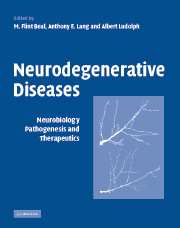Book contents
- Frontmatter
- Contents
- List of contributors
- Preface
- Part I Basic aspects of neurodegeneration
- Part II Neuroimaging in neurodegeneration
- Part III Therapeutic approaches in neurodegeneration
- Normal aging
- Part IV Alzheimer's disease
- 27 Mild cognitive impairment
- 28 Alzheimer's disease: overview
- 29 The neuropathology of Alzheimer's disease in the year 2005
- 30 Genetics of Alzheimer's disease
- 31 The role of ß-amyloid in Alzheimer's disease
- 32 Treatment of Alzheimer's disease
- Part VI Other Dementias
- Part VII Parkinson's and related movement disorders
- Part VIII Cerebellar degenerations
- Part IX Motor neuron diseases
- Part X Other neurodegenerative diseases
- Index
- References
27 - Mild cognitive impairment
from Part IV - Alzheimer's disease
Published online by Cambridge University Press: 04 August 2010
- Frontmatter
- Contents
- List of contributors
- Preface
- Part I Basic aspects of neurodegeneration
- Part II Neuroimaging in neurodegeneration
- Part III Therapeutic approaches in neurodegeneration
- Normal aging
- Part IV Alzheimer's disease
- 27 Mild cognitive impairment
- 28 Alzheimer's disease: overview
- 29 The neuropathology of Alzheimer's disease in the year 2005
- 30 Genetics of Alzheimer's disease
- 31 The role of ß-amyloid in Alzheimer's disease
- 32 Treatment of Alzheimer's disease
- Part VI Other Dementias
- Part VII Parkinson's and related movement disorders
- Part VIII Cerebellar degenerations
- Part IX Motor neuron diseases
- Part X Other neurodegenerative diseases
- Index
- References
Summary
Overview
As research in aging and dementia moves toward an earlier identification of individuals with a cognitive impairment, the concept of mild cognitive impairment (MCI) has received considerable attention. Mild cognitive impairment refers to an intermediate stage between the cognitive changes that are felt to be part of normal aging and those that represent the very earliest features of a dementia such as Alzheimer's disease. This stage of intermediate impairment is believed to be important, since several studies have indicated that these subjects are likely to progress to AD at an accelerated rate over the general population (Petersen et al., 1999). The initial literature on the concept of MCI pertained to individuals with memory impairment beyond what would be expected for normal aging (Petersen, 1995). These subjects may have a mild impairment in other cognitive domains but performance is felt to be within the range of normal. Similarly, they may have slight difficulties with activities of daily living, but these are generally felt not to be significant. More recently, the construct of MCI has been broadened to include other presentations of persons with transitional cognitive impairment and these will be discussed below. Implicit in the discussion of MCI is an understanding of the concept of normal cognitive function. While we are learning a great deal about aging and cognitive function, this still remains an area of uncertainty.
- Type
- Chapter
- Information
- Neurodegenerative DiseasesNeurobiology, Pathogenesis and Therapeutics, pp. 409 - 415Publisher: Cambridge University PressPrint publication year: 2005



